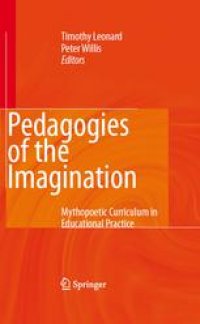
Ebook: Pedagogies of the Imagination: Mythopoetic Curriculum in Educational Practice
- Tags: Curriculum Studies, Educational Philosophy, Learning & Instruction, Teacher Education, Professional & Vocational Education
- Year: 2008
- Publisher: Springer Netherlands
- Edition: 1
- Language: English
- pdf
This book is about the practice of Imaginal Knowing in education. Imaginal knowing is not fantasy, but is linked to the way humans imagine the real world. Imaginal knowing moves the heart, holds the imagination, finds the fit between self-stories, public myths, and the content of cultural knowledge. It is deeply personal, yet open to the universe. The curriculum, as conceptualized here, is the medium through which imaginal knowing is evoked in both teachers and students.
Educators from United States, Australia, the United Kingdom and Canada offer a vision of educational practice seasoned in years of reflective pedagogic engagement. They speak here of a genuine and practical alternative to overly bureaucratic educational processes that can crush learners through a closed system of arbitrary standards and mindless testing. There is hope that education at all levels from elementary to professional, graduate and post compulsory education has the capacity to break out of these artificial constraints. These authors show us ways to make this possible.
This book is about the practice of Imaginal Knowing in education. Imaginal knowing is not fantasy, but is linked to the way humans imagine the real world. Imaginal knowing moves the heart, holds the imagination, finds the fit between self-stories, public myths, and the content of cultural knowledge. It is deeply personal, yet open to the universe. The curriculum, as conceptualized here, is the medium through which imaginal knowing is evoked in both teachers and students.
Educators from United States, Australia, the United Kingdom and Canada offer a vision of educational practice seasoned in years of reflective pedagogic engagement. They speak here of a genuine and practical alternative to overly bureaucratic educational processes that can crush learners through a closed system of arbitrary standards and mindless testing. There is hope that education at all levels from elementary to professional, graduate and post compulsory education has the capacity to break out of these artificial constraints. These authors show us ways to make this possible.